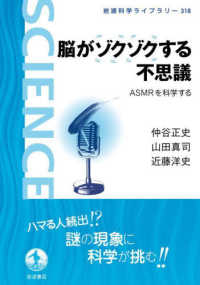- ホーム
- > 洋書
- > 英文書
- > Philosophy
Full Description
A practical guide to facilitating philosophical conversations with groups (especially in schools) based on philosophical and pedagogical principles derived from the ancient Greek philosophers but supported my modern-day research and pedagogical practices. It divides facilitation up into basic, expert and advanced levels, allowing a teacher to get going with some basic moves and principles allowing for development of facilitation over time. As well as being packed with practical strategies, questioning prompts and methods for developing metacognition and critical thinking in pupils, it also has brand new session plans published nowhere else previously.
Contents
Foreword
Preface
A little background
Acknowledgements
Introduction to PhiE
Part One: Philosophy and dialectic
What is philosophy?
Philosophy as conversation
The 4 'R's
Logos and flux
Ambivalence: Two-eyed thinking
The reason for reason in philosophy
Philo-Sophia and the love of learning
And to the children?
A word about right and wrong answers in philosophy
Dialectic
The origins of dialectic
Heraclitus
The dialectical effect: thinking flows like a river
Socrates
Plato
Aspects of Platonic dialectic
Correspondence to PhiE
Two dialectics in Plato's Parmenides
Aristotle
Aristotle and PhiE
Community of Enquiry
Part Two: Core values of PhiE
Ancient core values of PhiE
Exploration and discovery
Dissent
Autonomy
Inquiry/Enquiry
An open, questioning mind-set
Friendship
Friendship: xenia and knowing thyself
Excellence
Excellence and competition: the paradox of Socrates
Oracy
Oracy: Aoidos
Oracy: small 'd' and big 'D' dialectics
Part Three: pedagogical principles of PhiE
A sensitive method
A descriptive approach
Philosophical maturity: was Plato wrong?
Capability
Interest and engagement
The need for conditions
The conditions
Ideal speech situations
Classroom culture
PhiE begins with intuitions
Within and without: is PhiE democratic?
Truth and knowledge
Ownership
Two keystone principles in PhiE: Absence and Open Questioning Mindset
Absence and Presence
Socrates' midwifery principle
From within
Open Questioning Mindset
Guess what's in my head
Problematisation
Blocking
'Guess what's in your head' and intentional sensitivity
Two aims of PhiE: dialectic and inclusion
Socratic irony and questioning mindsets
In summary
Bibliography
About the author







